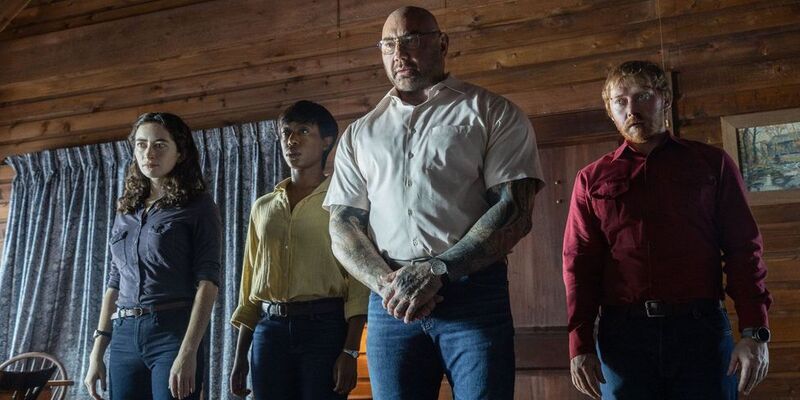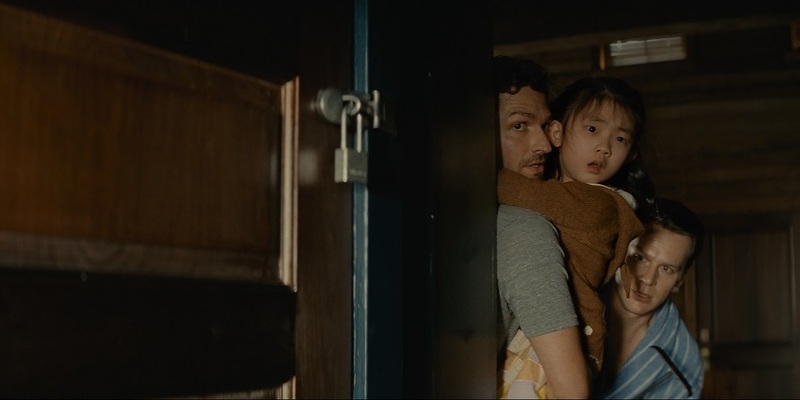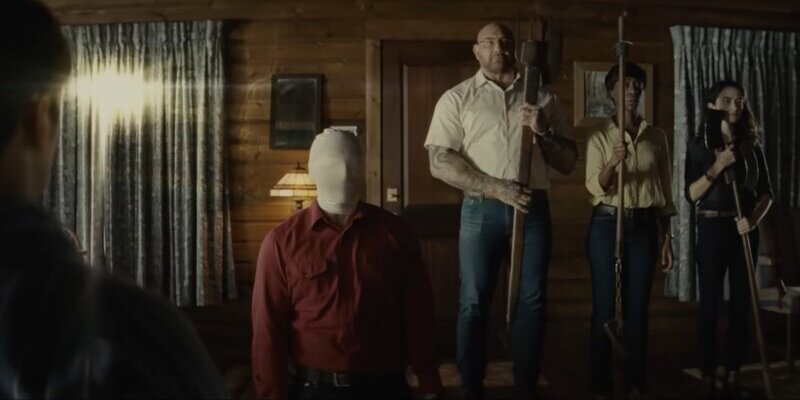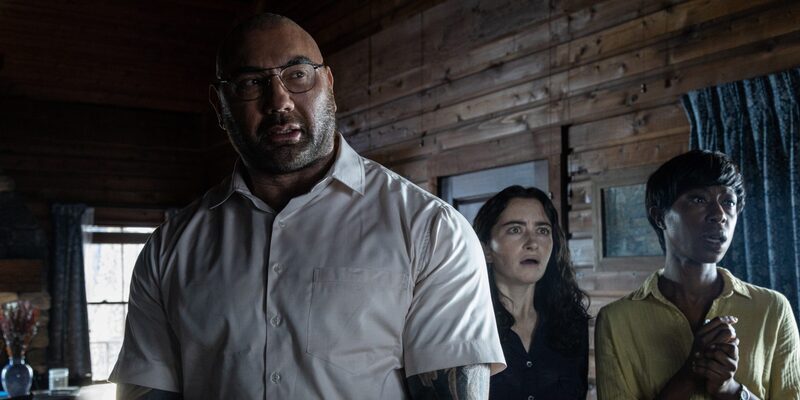
Review by
Eric Hillis
Directed by: M. Night Shyamalan
Starring: Dave Bautista, Jonathan Groff, Ben Aldridge, Nikki Amuka-Bird, Kristen
Cui, Abby Quinn, Rupert Grint

When he burst onto the scene in the late 1990s with
The Sixth Sense (albeit not his first film, but who
remembers Praying with Anger and Wide Awake?), writer/director M. Night Shyamalan was compared to the likes
of Steven Spielberg and Rod Serling. In the decades since, a more apt
comparison might be Stephen King, for while the director's best films
keep you involved to a point, they've tended to collapse in their final
acts.
That's almost the case once again with Knock at the Cabin, a project that unusually didn't originate from Shyamalan's own
imagination, but rather is a reworking of a script by
Steve Desmond and Michael Sherman, which itself was based
on the novel 'The Cabin at the End of the World' by
Paul G. Tremblay. But this is very much a Shyamalan project,
showcasing the strongest and weakest aspects of the filmmaker's
talents.

It opens with Shyamalan at his best, with a tense sequence in which a
young girl, Wen (Kristen Cui, excellent), is approached by a
mountainous stranger in the woods near the cabin where she's holidaying
with her adoptive parents, same-sex couple Eric (Jonathan Groff)
and Andrew (Ben Aldridge). The stranger, who introduces himself
as Leonard (Dave Bautista, giving the best performance by a
wrestler since Roddy Piper in They Live), speaks very softly and goes out of his way to come off as
non-threatening to the child, but this only makes him all the more
creepy. When three other strangers – Sabrina (Nikki Amuka-Bird),
Adriane (Abby Quinn) and Redmond (Rupert Grint) – appear
wielding dangerous looking homemade weapons, Wen flees back to her dads
and warns them that trouble is coming.
When Eric and Andrew refuse to let the strangers in, they find their
cabin under siege, ending in Leonard and his chums breaking in and tying
up the family. With the exception of the aggressive Redmond, the
strangers are apologetic for their actions, insisting that they wish
they didn't have to behave in such a way. Leonard explains that they're
on a mission, and that Eric, Andrew and Wen have been chosen for a
special cause. A world-ending apocalypse is coming, and it can only be
averted by the family choosing one of their own to be sacrificed.

It's a knockout premise, and for much of the run time Shyamalan rings
every last drop of tension and intrigue from the striking scenario.
Whether the claims of Leonard and co. are real or not is left clouded
for roughly the film's first half. What's clear is that they certainly
believe in the mission they're on, regardless of whether they happen to
be deluded or not.
This theme of belief also plays into the dynamic between Eric and
Andrew. We're given hints that Eric was once religious but has kept his
faith concealed since falling for the aggressively atheistic Andrew.
This causes a rift in the pair as Eric starts to question whether
Leonard's claims may be real, something Andrew simply isn't willing to
consider, no matter how much evidence is presented to support the
case.
That evidence comes in the form of apocalyptic news reports, the sort
of thing Shyamalan does very well and which remind us of that standout
moment in Signs where we're shown a news report of an
alien turning up at a children's party.

What's most interesting about Knock at the Cabin is how
it forces us to question who the real villain is here, if something as
black and white as a villain even exists in this scenario. Kudos to
Shyamalan for daring to make a gay character unlikeable in the form of
the abrasive Andrew. While it's never mentioned, we can't help but
wonder if Eric is the victim of a psychologically abusive relationship,
so forceful is Andrew, though via a flashback we're given a reason for
Andrew's rage. Too many mainstream movies tend to treat gay men
patronisingly, as though they're some sort of angelic beings and not
simply humans with all the same flaws and weaknesses as everyone else.
Shyamalan sets his stall out early on in this regard when Wen mentions
how she mistrusts the people who keep telling her how great it is that
she has two dads.
Yet while we're kept gripped by the potentially looming apocalypse and
the smaller human drama between Eric and Andrew, the film runs out of
ideas in its final stretch, and anyone expecting one of Shyamalan's
trademark twists will be sorely disappointed as the film simply peters
out to its most obvious conclusion. The strange thing is, through
recurring flashbacks Shyamalan appears to be building to one of his
twists. When this fails to materialise we're left to wonder what was the
point of the flashbacks? You might surmise that they were left over from
an earlier draft and Shyamalan stuck with them to pad out the film's
running time. The filmmaker changed the ending of the original novel,
which ironically reads like more of a traditional Shyamalan ending than
the one we get here. It's not a bad ending per se, just an underwhelming
one (think Spielberg's War of the Worlds), and while it doesn't retroactively ruin the tense 70 minutes or so
that lead up to it, it will likely affect the film's
rewatchability.


